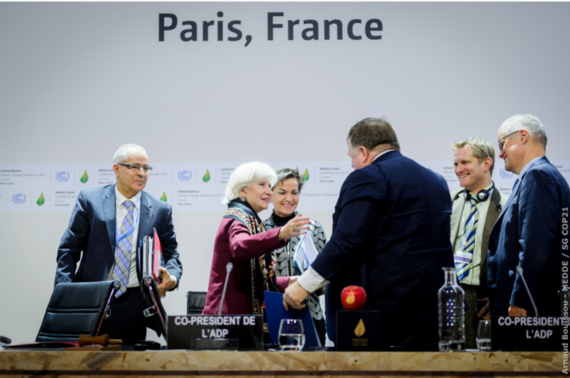
PARIS - Every so often as the crowded Paris Metro approaches a station, a female voice comes over the intercom advising us to "watch the gap." She means the gap between the train and the platform as we exit. But this week in particular, the gap most worth watching is all about global climate change. It is the crevasse between what the international community must do to keep climate change in check and what nations have been been willing to do so far.
Judging by the crowds strolling through the city's famous streets, life has returned to normal in Paris. The only reminders of the terrorist attack a few weeks ago are France's national flag hanging from windows, flowers placed at the base of some of the city's monuments, and groups of heavily armed police and soldiers standing guard here and there.
The biggest abnormality this week is the tens of thousands of diplomats, national delegates, journalists, public officials, and representatives of foundations and non-government organizations who are meeting at a sprawling conference facility located on a former airport outside the city. They have come from nearly 200 countries with the expectation that by the end of this week, we will finally have a concrete global agreement in which each nation promises to limit its greenhouse gas emissions. The agreement has been 21 years in the making.
During the first week of the two-week Conference of the Parties, as it's called, negotiators agreed on a draft, 48 pages of contract-like language interspersed with more than 1,000 sets of brackets. The brackets mark unresolved issues that must be settled by this weekend if the conference is to be successful. As we'd expect, the unsettled issues are among the most important. As a clever headline in the Atlantic put it, "The Fate of the World Lies In Between Brackets".
That might be hyperbole, but not by much. Here are some of the decisions negotiators must make in the next 5 days:
•Will the international community stick with its goal to keep global warming to no more than 2oC over pre-industrial levels, or will it adopt a more ambitious goal? Scientists say the 2C goal is no longer adequate to avoid the worst consequences of climate change. One undecided issue in the draft agreement is whether to keep warming to less than 1.5C.
•What will the future of fossil fuels be? One option in the draft suggests that the world should reach zero carbon emissions in the 2060-2080 timeframe.
•How much money and technical assistance will well-to-do countries provide to developing countries? The draft makes clear that significant help will be necessary for less developed nations to hold their carbon emissions in check at the same time they grow their economies and alleviate poverty. The current commitment from wealthier countries is to provide less developed nations with $100 billion annually to mitigate greenhouse gas emissions and adapt to climate change. The draft makes clear that this amount is the minimum and it must increase over time. One bracketed option describes this as "long-term, scaled-up, predictable, new and additional finance, technology and capacity-building".
•Will nations establish an International Tribunal of Climate Justice to "address" situations in which nations do not keep their commitments? What would "address" mean? Would nations that willfully fail to meet their obligations be subject to tough sanctions?
•How will the world monitor progress? One option in the draft is to require that each nation provide "transparent, accurate, complete, consistent, and comparable information" on their emission reductions. But the draft also says that countries can "take into account their common but differentiated responsibilities and their specific national and regional development priorities, objectives, and circumstances." That is diplomatic-speak for "wiggle room".
International officials enjoyed a brief celebration last week when the Paris process produced the draft agreement (see photo). But the Champaign bottles should not be uncorked yet. Negotiators will have to work virtually around the clock this week to resolve the issues inside the 1,000 brackets. We'll know in a few days whether they make the right kind of history.
* * *
Despite rumors of ongoing wrangling behind closed doors, there is a great deal of hope here that negotiations will be successful. But there is an unwritten subtext to whatever agreement is achieved. The reality is that a Paris agreement will be little more than a catalogue of national aspirations to control greenhouse gas pollution. Parts of it may be legally binding, meaning that countries that renege could be subject to some sort of sanction. But if the world is to prevent irreversible climate catastrophe, the most meaningful commitments must come from investors, businesses, entrepreneurs, engineers, state and local governments, utilities, consumers and many others at the grassroots level.
Victory requires more than drawing down carbon pollution; it requires that the entire world switch to a clean energy economy. It means that governments will have to back up their commitments by eliminating public subsidies for fossil fuels, by putting a price on carbon and by reforming the policies that were created by and for the old carbon economy. Should negotiators succeed this week, the Paris agreement would be a historic step forward, but it would be only a modest step in what must be a profound transformation of the global economy and the values that drive it.

